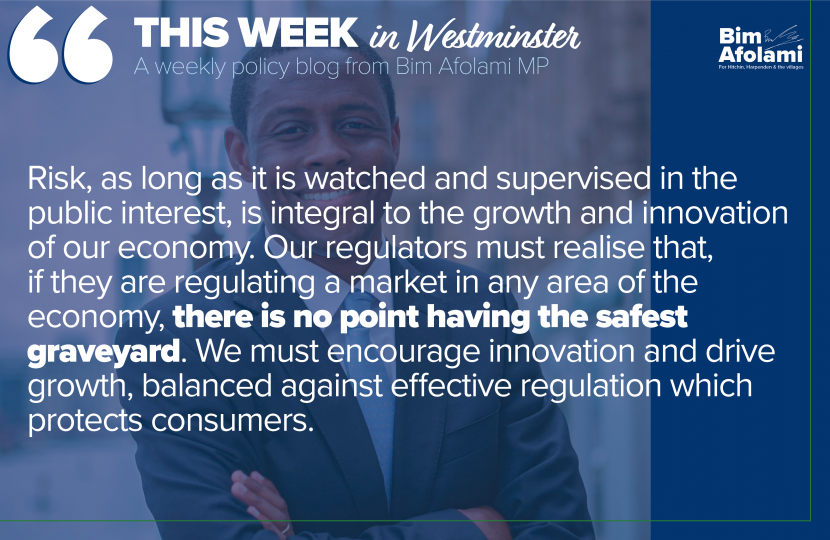
As Economic Secretary to the Treasury and City Minister, one of my primary roles is liaising with the Financial Conduct Authority (FCA) and the Prudential Regulation Authority (PRA), two of the UK's key economic regulators. My job is to ensure that there are open lines of communication between Government and regulators, guaranteeing both the independence of regulators and harmony between regulators and Government.
Regulation is a hugely important feature of modern life, with profound effects on our day-to-day lives - whether it's your mortgage, your pension, or how much you're allowed to borrow as a small business, regulation has a huge direct impact on what consumers can and can't do. Getting regulation right, therefore, is key - regulation might be unglamorous, but it also could be the key to unlocking greater prosperity for the public without borrowing more money or increasing the tax burden on working people.
Business owners in Hitchin & Harpenden will all be familiar with regulators, and their inadvertent tendency towards restriction and regulation. By asking regulators to ensure that their responses to potential problems are proportionate and do not impose onerous costs, we can help businesses to thrive and grow, freed from the cumbersome burden of compliance checks, paperwork, and additional costs.
Last week, I spoke at the FT Global Banking Summit on the principles that I will use to guide my relationships with the regulators. In short, I firmly believe that our regulators need to be more comfortable with the necessity of risk-taking. Risk, as long as it is watched and supervised in the public interest, is integral to the growth and innovation of our economy. Our regulators must realise that, if they are regulating a market in any area of the economy, there is no point having the safest graveyard. We must encourage innovation and drive growth, balanced against effective regulation which protects consumers.
However, this doesn't mean deregulation - it can also mean simplification, greater accountability, and redistribution of powers. Sometimes, it's important that we regulate new and emerging areas of the economy, in order to ensure that the public is protected. When we do so, we should seek to strike the right balance between protecting the public and allowing innovative companies to grow and succeed, in turn powering our economy. Over-regulation leads to fewer successful businesses in this country, reducing the amount of tax money that the Treasury can spend on public services like hospitals, schools, and the police. An environment in which regulation fosters growth is in our national interest - and in the interests of Hitchin & Harpenden.
In my role as a Minister, I will continue to put the importance of regulation on the agenda, given the profound impacts that regulation has on the country at large, as well as on the lives of people in Hitchin & Harpenden. A desire for greater accountability from those who make the rules, an understanding of the necessity of risk - I am confident that these are principles which we all share. I look forward to putting them into practice.

